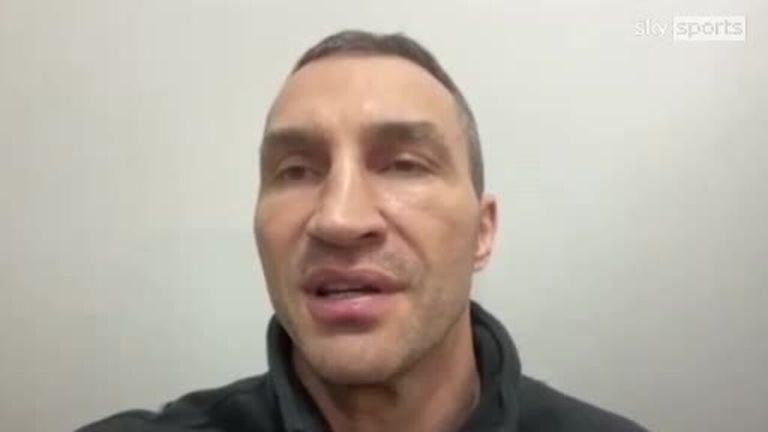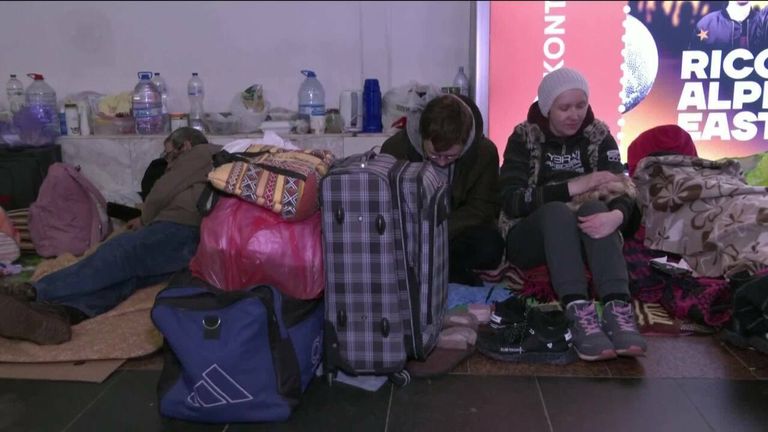Paulo Fonseca describes harrowing 30-hour escape from Ukraine
Paulo Fonseca relives his experience in Ukraine at the start of the Russian invasion: "I'm seeing all Europe trying to help everyone, I understand the political situation, but I have to say it's not enough. I don't know what more we can do, but we have to do more - or they will all die"
Thursday 3 March 2022 13:43, UK
Former Roma and Shakhtar Donetsk manager Paulo Fonseca has described how he spent over a day in an underground bunker before a 30-hour drive to escape from the invasion of Ukraine.
Fonseca, who was close to being named as Tottenham's manager in the summer, cut short a holiday in the Maldives to return to Ukraine - the nation of his wife's birth - shortly ahead of the Russian invasion last week to help her family escape the country.
However, hours before they were due to leave their Kyiv apartment, the 48-year-old was awoken in the middle of the night by the sound of missiles hitting the Ukrainian capital.
A rapid attempt to leave the city followed but was soon cut short by gridlock around the main roads - and instead, the family headed east when he was contacted by the sporting director of Shakhtar, Dario Srna, who suggested returning to Donetsk to take shelter.
- Andriy Shevchenko: Football means nothing, my family refuse to leave Ukraine
- Contribute to the humanitarian fund for Ukraine
- Donate to With Ukraine
"We didn't know what to do. Everyone was trying to leave Kyiv," Fonseca told Sky Sports News. "Dario called me and said to come to the hotel owned by the president of Shakhtar. We moved to the hotel there, and stayed in a bunker there overnight, for one and a half days overall, with the Brazilian players from Shakhtar and the technical team.
"I started to think the situation was only going to get worse so we contacted the Portuguese embassy and they said tomorrow, we'll have a car and you can go. I decided to leave in the morning, the day after the car picked us up from the hotel and we started a long trip to the border. It was dangerous, we travelled all day and night without stopping.
"The journey was 30 hours, more including across the border with Moldova to where we were staying in Romania. I saw many times the troops of Ukraine pass on the road, we stopped and listened to the alarms, many times, and there was a lot of traffic.
"We spent a lot of time going 5kmph. During the trip, of course, we were in danger even driving in the night, and I heard the planes passing, but I didn't see shooting or fighting. We travelled with another family, a couple with a six-month-old baby. In the end we arrived on the border and felt safe, which was the most important thing."
It is nearly three years since Fonseca left his role as Shakhtar manager but the ex-Roma boss remains in contact with his former colleagues and issued a downbeat assessment when asked about their hopes of managing to follow in his footsteps and leave one of Ukraine's most embattled regions.
He said: "I'm in contact all the time with some of the people who worked with me at Shakhtar, they are trying to survive but it's difficult. To leave the country now, is almost impossible and I'm very worried for them. I would like to help them, so much, but I feel impotent to do that. We're very sad about the situation.
"I have to confess, during this time I haven't thought about football. This is so much more important than everything, and believe me, we are suffering a lot with the situation. These people, this country, doesn't deserve what is happening. But they are heroes, they are fighting, and it's really difficult for us to see the situation in Ukraine.
"This reality has shown me we have things much more important than football. I love my profession, I love football, but the life of the people is much more important.
"I would like so much to help them, but I'm feeling impotent to help. We're very sad with the situation."
Fonseca delivered an equally stark warning about his own beliefs regarding the Russian invasion, and, like Kyiv mayor Vladimir Klitschko and former Ukraine manager Andriy Shevchenko, urged Western countries to do more to help avoid dire consequences for the Ukrainian population.
He said: "It's difficult to speak about one person who wants to kill a country, people who don't deserve to live through what they're living. It's so unfair. People in Ukraine just want peace. I'm seeing all of Europe trying to help everyone, I understand the political situation, but I have to say it's not enough. I don't know what more we can do, but we have to do more."






